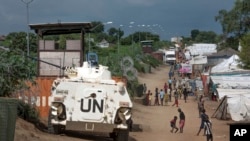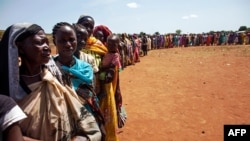United States and United Nations representatives warned in separate meetings Wednesday of escalated tension and potential violence in South Sudan.
“We have credible information that the South Sudanese government is currently targeting civilians in Central Equatoria and preparing for large-scale attacks in the coming days or weeks,” Keith Harper, the U.S. representative at the U.N. Human Rights Council, said in Geneva.
The claim was quickly rejected by his South Sudanese counterpart, and South Sudan ambassador Kuol Alor Kuol Arop denied any build-up of forces or plans for an offensive in an interview with the Associated Press.
“We are raising the alarm. We are calling on the government of South Sudan not to move forward with the offensive they have planned,” U.S. Ambassador to the U.N. Samantha Power told VOA in New York.
In Juba on Wednesday, U.N. human rights experts warned of “unprecedented” levels of violence and ethnic tension across the war-torn country.
“Many expect intensified fighting now that the dry season is setting in,” said Yasmin Sooka of the U.N. Commission on Human Rights in South Sudan, following a fact-finding mission.
A group of international monitors were blocked by the government from traveling to Central Equatoria to investigate violations of the country’s peace deal earlier this week, AP reported.
Calls for arms embargo, sanctions
The United States has been pressing for a U.N. arms embargo and other targeted sanctions against the government of South Sudan and opposition leader Riek Machar, but has been recently stalled in its efforts by a lack of unity among the 15 Security Council members.
“We are urging Security Council members to act quickly to impose an arms embargo in order to change at least one dimension of the South Sudanese government’s actions – which is their propensity for choosing arms systems over food for their people,” Power said.
The U.S.-drafted resolution also seeks to impose asset freezes and travel bans on SPLA Chief of Staff Paul Malong, South Sudan’s Information Minister Michael Makuei Lueth, and SPLA in Opposition leader Riek Machar – who fled the country first for the DRC in August and is currently in South Africa.
The draft text has received tepid support among council members. Russia has expressed an outright objection to the arms embargo, while others have expressed reservations and objections.
Ambassador Power told VOA it is time the government puts its people first.
“We have seen South Sudan again and again investing in attack helicopters and other military means so as to pursue offensives in the Equatorias and other places, instead of actually dealing with the incipient famine that exists in large parts of South Sudan,” she said.
Genocide warning
Earlier this month, Adama Dieng, the U.N. secretary-general's adviser on the prevention of genocide, warned of the risk of "outright ethnic war" and the "potential for genocide" in Central Equatoria and the Yei region.
The conflict in South Sudan began nearly three years ago when President Salva Kiir accused his former deputy and political rival Riek Machar of plotting a coup.
Since then, fighting largely along ethnic lines has killed tens of thousands of people and displaced more than two million from their homes.


